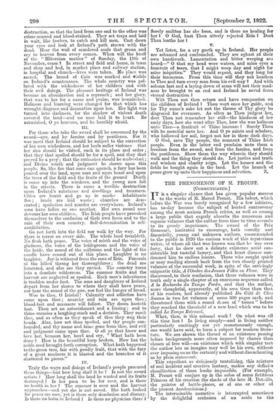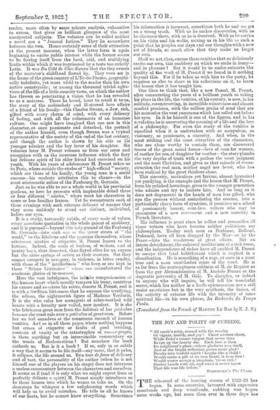111.t, PHENOMENON OF M. PROUST.
[COMMUNICATED.]
TT is a singular chance that has given popular success to the works of M. Marcel Proust. His talent, which before the War was barely recognized by a few initiates, has to-day become the subject of heated controversy among the most serious French critics, as well as among a large public that eagerly absorbs the numerous and copious volumes that the author from time to time accords to its greedy impatience. The award of the Prix Goncourt, instituted to encourage, both morally and financially, young and unknown authors, recommended to the public in 1920 the curious work of this mysterious write, of whom all that was known was that he was over forty, that he drew out a delicate existence amid con- siderable but tasteful luxury, and that heart disease con- demned him to endless leisure. Those who sought quick or easy reading shrank back from the two closely printed volumes of the successful work, in spite of the enticingly enigmatic title, A l'Ombre des Jeunes Filles en Fleur. They discovered, to their confusion, that these volumes were in truth only a single chapter of an enormous sequence called A la Recherche du Temps Perdu, and that the author, more thoughtful, apparently, of his own time than that of his readers, had already published Du Cote de Chez Swann in two fat volumes of some 500 pages each, and threatened them with a round dozen of " tomes " before they reached the threshold of a new land which was to be called Le Temps Retrouve.
What, then, is this colossal work ? On what was all this time lost ? In living simply—and in living neither particularly excitingly nor yet monotonously enough, one would have said, to form a subject for modern litera- ture. We are shown the thread of an existence passing before backgrounds more often imposed by chance than chosen of free will—an existence which with singular tact the author lets us imagine may well be his own, without ever imposing onus the certainty and without disenchanting us by plain statement. This expedient so deliciously tantalizing, this mixture of real incident and creative fantasy, makes any definite classification of these books impossible. (For example, M. Proust will conjure up in the salon of some fictitious Princess of his creation the shade of the late M. Detaille, the painter of battle-pieces, or of one or other of the present Academicians.) The interminable narrative is interrupted sometimes by the delightful archaism of an aside to thil. reader, more often by some minute analysis, exhaustive to excess, that gives us brilliant glimpses of the most unexpected subjects. The volumes can be called neither a novel nor a " Journal Intime." They lie somewhere between the two. Hence certainly some of their attraction at the present moment, when the latter form is again beginning to excite publics interest while the former seems to be freeing itself from the hard, arid, and stultifying limits within which it was imprisoned by a taste too strictly Latin. It was Du Cote de Chez Swann that the tiny events of the narrator's childhood flowed by. They were set in the frame of the green country of L'Ile-de-France, geographi- cally indefinite, yet more vivid to the reader than his own native countryside ; or among the thousand trivial agita- tions of the life of a little country town, on which the author has thrown so penetrating a vision that he has revealed to us a universe. There he heard, later to retail it to us, the story of the melancholy and ill-starred love affairs of a friend of his family—this Charles Swann, a Jew, rich, gifted with every charm of mind, with every delicacy of feeling, and with all the refinements of an immense culture. One might have imagined that one saw in this character, at once passionate and detached, the portrait of the author himself, even though Swami was a typical representative of the society of the end of the last century, and though the author is shown by his side as his younger admirer and the boy lover of his daughter. Six volumes later M. Proust releases us from our error and recognizes with us the immense influence which the fiery but delicate spirit of his older friend had exercised on his youth. With his years of adolescence M. Proust takes us to Paris, where outside the circles of " high-official " society, which are those of his family, the young man is a social success—his modesty "attributes this to chance—in the most aristocratic salons of the Faubourg St. Germain. Just as he was able to see a whole world in his provincial gardens, so here he presents with implacable detail three or four different " soirees," where meet his characters in more or less familiar frames. Yet he reconstructs each of these evenings with such extreme delicacy of nuance that they seem suddenly to stand out distinct, individual, before our eyes. It is a study, torturedly subtle, of every scale of values, every mondaine quotation in the whole gamut of snobbery, and it is pursued—beyond this holy ground of the Faubourg St. Germain—into each one of the lower strata, of " the world," to the kitchens and the pantries themselves, whose uttermost niceties of etiquette M. Proust knows to the bottom. Indeed, the souls of butlers, of waiters, and of pantry boys, thus dissected, thus flayed alive for us, expose but the same springs of action as their masters. But they cannot compete in savagery, in violence, in bitter cruelty, with those of the " intellectuals " who keep or are kept in those " Salons Litteraires " where are manufactured the • academic glories of to-morrow. Here the vast indulgence, the infinite comprehension of the human heart which usually tempers his irony, contrives his excuse and sweetens his satire, deserts M. Proust, and it is with a Swiftian bitterness that he exposes the terrifying, the odious, the nightmarish figure of Madame Verdurin. It is she who- rules her menagerie of sabre-toothed wild beasts with a ferocity now veiled, now insolent. It is she who fabricates great men from the habitues of her petit-clan because she must rule over a petit-clan of great men. Before her we feel ourselves at the monstrous summit of human vanities. And so in all these pages, where nothing,happens but errors of etiquette or faults of good breeding, contests of vanity or the catastrophes of amour-propre, is there anything but an interminable commentary on the words of Ecclesiasticus ? But somehow the book enthrals us. But is it a book ? If so, only in so subtle a way that it seems to be life itself—nay more, that it pales, it eclipses, the life around us. By a tour de force of delicacy and of tact, the personality of the author (when he is not himself one of the players on his stage) does not interpose a useless commentary between the characters and ourselves. It seems as if (and it is only what we might expect from so perfectly delicate a spirit) M. Proust simply introduces us to those houses into which he wants to take us. On the doorsteps he whispers a few enlightening words which will help us to avoid mistakes. He tells us all he knows of our hosts, but he cannot know everything. Sometimes his information is incorrect, sometimes both he and we get on a wrong track. With us he makes discoveries, with us he discusses them, with us he is deceived. With us he carries on his visits and his walks, mixing us in his life to such a point that he peoples our days and our thoughts with a new set of friends, so much alive that they make us forget our own.
Shall we not, then, excuse these vanities that so deliciously excite our own, this snobbery on which we smile in irony— and in pleasure ? But it would be to under-estimate the quality of the work of M. Proust if we found in it nothing beyond this. For if he takes us with him to the party, he requires us also to share in his reflections on it, to learn the lesson that it has taught him.
One likes to think that, like a new Pascal, M. Proust, after consecrating the years of a brilliant youth to taking his place in the life, the vanities, of his century, is now, in his solitude, reconstructing, in incredible minuteness and almost morbid precision, with the million grains of sand that are his memories the vast panorama which has rolled out befora his eyes. In it he himself is one of the figures, and in his revelation he is uncovering the meaning of a life and the lore of a philosophy. For even the study of the vanities is ennobled when it is undertaken with so scrupulous, so visionary, so passionate, a sincerity. And when, in the most striking and the most attractive of the characters, who are alone worthy to contain them, are discovered traces of the great moral forces—love of man for woman, of mother for son, of daughter for mother—the story plumbs the very depths of truth with a pathos the most poignant and the most Christian, and gives us that miracle of recon- struction the real man, neither angel nor beast, who has been realized by the great thinkers alone.
This sincerity, meticulous yet furious, almost hysterical yet purifying, is the example and the lesson that M. Proust, from his polished hermitage, gives to the younger generation who admire and try to imitate him. And so long as it does not degenerate in the hands of men less gifted, who ape the process without assimilating the essence, into a particularly cheap form of cynicism, it promises us a school of passionately honest, cant-free, writers who may be precursors of a new movement and a new morality in French literature.
His influence is great since he rallies and personifies all those writers who have become neither politicians nor philosophers. To-day such men as Barbusse, Rolland, Duhamel, have all been dragged by the War—or by the Peace—into the maelstrom of great affairs. But an innate detachment, the enforced meditations of a sick room, and the independence of riches have all enabled M. Proust to escape that fatal belittlement which is implied in a classification. He is something of a sage, at once in a most true and a most unorthodox sense of the word. He is as far from the contemptuous coldness of M. de Regnier as from the gay Alexandrianism of M. Anatole France or the dogmatic perversity of M. Gide. To disciples, or indeed to anyone who will inquire, he will tell his wonderful secret, which lies neither in a facile epicureanism nor a still easier asceticism but in the very synthesis, the fusion, of the activity of exterior life with the intensity of inner spiritual life—in his own phrase, La Recherche du Temps Perdu.
(Translated from the French of MARTHE LE BAS by E. J. S.)



































 Previous page
Previous page